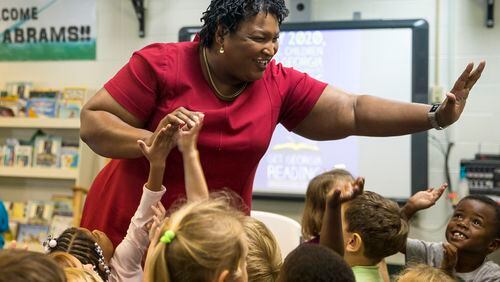Democrat Stacey Abrams is running for governor. While in the Georgia Legislature, Abrams worked on many issues involving children, including school funding.
On Thursday, Abrams released details about her education plan. It includes increasing teacher salaries from the current average of $62,500 to an average of $73,500 in the first gubernatorial term. She wants to invest in a rural teacher pipeline project by partnering with Georgia colleges and universities to recruit students to teach in rural areas for four years in exchange for free college tuition. Abrams also wants to repeal legislation banning books and oppose efforts to sanction librarians and others.
In this guest column, Abrams talks about what she learned and outlines what she intends to do as governor for education if elected in November.
By Stacey Abrams
One of the highest priorities of state government — the obligation enshrined in our constitution and anchored in every budget — is public education. Our youngest Georgians are the leaders, innovators and problem solvers of the future, and they hail from every ZIP code, every county. As such, effective public education reaches out to and serves all of our students, regardless of background, location or need.
True leadership in public education means going beyond election year platitudes and political promises. I have a record of doing exactly this and a plan that will ensure all of Georgia’s students, as well as our entire economy, can truly thrive.
As a legislative leader for 11 years, I opposed GOP budgets laden with deep cuts and supported fiscal plans that finally began to invest in our schools. I helped defeat the disastrous school takeover bill that would have denied parents and communities a voice in education. In one of my proudest achievements, I have been credited by people on both sides of the aisle for saving the state’s groundbreaking pre-K program from the chopping block in 2011.
Nearly 20 years of education cuts have weakened public education. As recently as 2020, the current governor cut nearly $1 billion from K-12 education at the height of the pandemic. Even after a massive infusion of federal dollars thanks to the American Rescue Plan Act passed by Democratic congressional leaders, recent K-12 budgets fail to make meaningful investments in long-term education recovery or retention of vital staff.
Paltry salary increases that do not meet the cost of inflation, coupled with overregulation of the classroom have contributed to a 67% retention rate for Georgia teachers in their first six years in the profession — a failing grade. My plan is comprehensive, affordable and achievable. Verified by economists and budget experts, my financial plan for education can be implemented in my first term — without raising taxes.
Georgia remains in the bottom 20 in the country in starting teacher salaries. I propose to raise the starting pay to $50,000 and provide significant raises to educators and other school employees. Doing so will aid in the recruitment and retention of educators and propel our standing into the top 10 nationally. I will also increase access to professional development and recruitment from our state’s universities, including rural institutions, historically Black colleges and universities and Hispanic-serving institutions, by expanding the use of the HOPE Scholarship to fund this essential need statewide.
In addition to low pay, the current administration has prioritized efforts to make daily life in the classroom untenable for educators and inadequate for students. The governor championed legislation that censors schools and bans students’ access to books. At a time when our schools are increasingly diverse, he has prevented educators from engaging in true and honest dialogue about history and social studies. His open support of bills that ban transgender students from playing sports and classroom discussions of race and racism betrays a refusal to support children who are at their most vulnerable.
Moreover, his extreme push to expand access to guns and the signing of gerrymandered board of education districts in rapidly changing counties, limiting the rise of Asian American Pacific Islander and Latino leaders in education decisions, demonstrate misplaced priorities. My focus will be on welcoming, safe and tolerant environments for students, educators and parents alike.
Georgia families understand, as does the American Psychological Association, that our children are in a mental health crisis due in part to the COVID-19 crisis. Without expansion of Medicaid, most of our vulnerable populations will not be able to receive the mental health parity access required by both federal and new state law. We will also be unable to attract the school counselors and therapists without additional funding and support. With a record surplus and American Rescue Plan Act funds, Georgia has the money to solve this challenge; but the current administration refuses to act. Other states are utilizing available funds to boost mental health infrastructure. We must do everything we can to ensure children, parents and educators have what they need to navigate the rampant changes COVID-19 has wrought on us all.
This administration has also failed to update Georgia’s antiquated education funding formula to truly meet students’ needs. However, the theater of pretend action is right on schedule with the recent convening of yet another legislative study. I was present for this last performance, and I read closely the reports, fiscal models and bitter pleas for assistance. But with the same cast of characters, it is difficult to believe that the outcome will change. Nominal salary increases and $125 gift cards do not seriously address resource shortages. As governor, I will not only revise the funding formula, but I will also prove that I am willing to work with anyone to get it done.
We know our students hold the key to Georgia’s next and greatest chapter: so, let’s invest in our future, give them the essential tools, resources, and funding they need to succeed, and stand with teachers, students, and families. It will mean more young people staying and starting families right here in Georgia, more innovation and new jobs, and stronger and more vibrant communities that truly make our state the best place it can be to live, work, and study.
Together, we can build one Georgia that realizes our promises and builds to make our hopes for our children real.
About the Author







